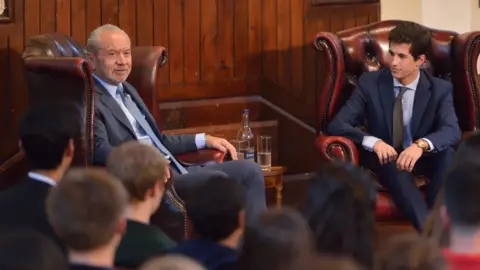The Apprentice: How does the show stay fresh after 15 years?
 BBC
BBCDesperate Housewives, Strictly Come Dancing, Lost, Entourage, House and Peppa Pig might not look like they have much in common, but all were launched in the same year - 2004.
It was, safe to say, a significant year for television.
And in addition to the US dramas, TV talent shows and preschool pigs, 2004 also happened to be the year a business show called The Apprentice began.
"Some of this year's [candidates] were five years old when we first started this programme," points out Lord Sugar ahead of the show's 15th series. "Youngsters I speak to every day of the week who stop me in the street love the programme and say they're inspired by it."
The Apprentice was an immediate success upon its launch in the US and the format was swiftly exported around the world. The UK series, which aired on BBC Two in February 2005, was promoted to BBC One after just two years because it was so popular, and the American version itself even produced a future president.
But while Lord Sugar sees no need to hang up his tie any time soon, the 72-year-old acknowledges it can't go on forever.
"I've got one more series [after this one] that I'm contracted for, which will be the 16th series," he says. "I might do it to 20. Twenty sounds like a round figure."

In 2010, the prize changed from a job in Lord Sugar's company to a £250,000 investment in the winning candidate's business idea. But beyond that, the format has broadly remained the same - 16 candidates, split equally in gender, competing in a series of challenges, with one being fired at the end of each weekly task.
"This raw and painful familiarity must be why The Apprentice continues to be so popular," wrote Lucy Sweet in The Big Issue last year. "Despite never changing an iota of its format, it's still rumbling on."
Stuart Heritage of The Guardian, meanwhile, has written an article calling for the show to be cancelled every year for the last five series. "The Apprentice, despite being roughly as enjoyable as getting pelted with sun-hardened donkey dung, inexplicably remains a thing," he said last year.
But the stars of the show argue that the format is kept fresh thanks to the new tasks which are added every year, often reflecting changes in technology. "They're right up to-date, last year it was robotics," says Lord Sugar.
"This year, they have to be music agents," picks up Baroness Karren Brady, "and represent an emerging artist and sell his music. There's an electric bike [task], there's a toy... they design a rollercoaster."
And coming up with the ideas for tasks is harder than it looks, argues Lord Sugar, because "one has to think of the logistics of a TV programme".
"In the early days, I thought of one task that I put to the production team of becoming a city trader - buying and selling shares and all that type of stuff. But the truth of the matter is that would make a very boring film. And there are other tasks that would be similar. So I think what we've got at the moment are tasks that have a physical element to them.
 Getty Images
Getty Images"Having the candidates making stuff in the kitchen is always interesting. One of my favourite tasks is buying the eight items and negotiating. So I do believe the physical side of things is important."
He adds: "The production company's team spend months researching and dreaming up these ideas and not only that, but also having to get partners to co-operate. To allow us to come into their venues, to go on their trains, to play with their equipment.
"Don't underestimate the amount of work that goes into that, the paperwork, it takes a lot of organising. The London borough of Islington, for example, doesn't allow you to put a camera on their streets unless you ask permission, all that stuff has got to be cleared."
Perhaps the most significant change for the show over the last 15 years is the changing landscape of television itself.
In 2004, BBC iPlayer didn't exist. The public largely watched TV programmes live, in their allotted timeslot. As a result, the viewing figures broadcasters received the next morning could make or break a show.
But, Lord Sugar says: "The figures that people quote of overnights now are all meaningless, because you have to add the iPlayer and the Sky Plus-type user that watches it afterwards, and when you start adding all those together, it comes to 10 million or something like that."
(He's being slightly generous there - the finale of the last series attracted 7.74 million when all platforms are included, according to ratings body Barb. The original overnight figure was 5.86 million, which meant nearly two million used catch-up services to watch.)
"The problem with our programme is the spoiler," Lord Sugar continues. "Because if you really want to follow it, you don't want to know who got fired the next day [if you haven't seen the episode]. So unlike something like Peaky Blinders for example, which you can pick up the day afterwards, you don't really want to pick up The Apprentice the day afterwards unless you cut yourself off from the world."
 Getty Images
Getty ImagesOne constant of every series of The Apprentice is how self-assured some the contestants are. In fact, this year's crop appear to have finally broken Claude Littner.
"Normally I'm completely dispassionate," he deadpans. "I watch the candidates day in and day out, and I don't really care. However, this year, I found them incredibly irritating. And as we go through, you'll be irritated as well, I guarantee it."
From the opening seconds of this series, you can see what he means. "Millions isn't enough for me, I need billions for the lifestyle I want," claims one candidate. "Cut me, and I'll bleed ambition," says another.
"We've got a pillow salesman, a librarian, a baker, a sports agent," says Baroness Brady of this year's crop of hopefuls. "There's no mould of a business person now, it's anybody with any kind of background or experience."
Lord Sugar agrees: "They are a different group of people, and that's what makes the programme each year, different characters from all walks of life."

The Apprentice begins on Wednesday 2 October at 21:00 BST on BBC One.
